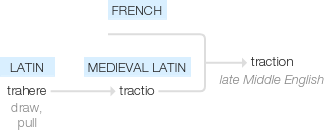Traction
late Middle English (denoting contraction, such as that of a muscle): from French, or from medieval Latin tractio(n- ), from Latin trahere ‘draw, pull’. Current senses date from the early 19th century.
wiktionary
From Medieval Latin tractio, from Latin tractus, perfect passive participle of verb trahere(“pull”), + noun of action suffix -io (genitive -ionis).
etymonline
traction (n.)
early 15c., "a drawing or pulling" (originally the pulling of a dislocated limb to reposition it), from Medieval Latin tractionem (nominative tractio) "a drawing" (mid-13c.), noun of action from past-participle stem of Latin trahere "to pull, draw" (see tract (n.1)). Sense of "friction between a wheel and the surface it moves upon" first appears 1825. In modern medical care, "a sustained pull to a part of the body to hold fractured bones in position," 1885.
